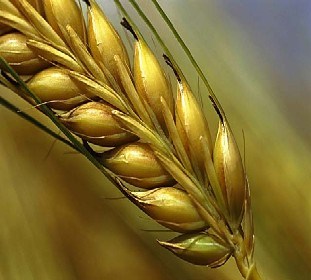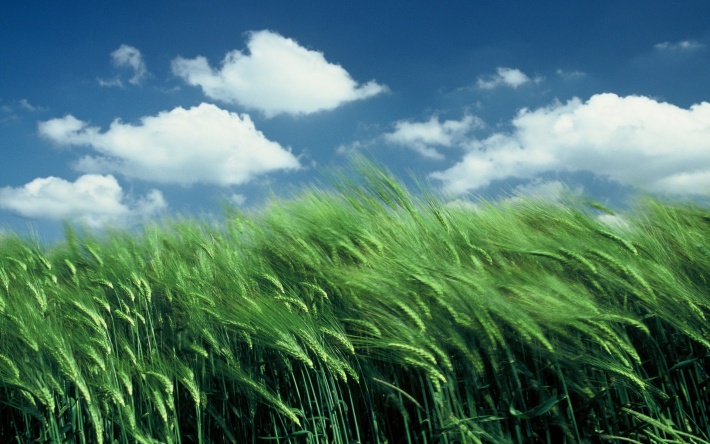

THE MISSION OF THE WHEAT-STALK.
A YELLOW stalk of wheat early one summer was rocking its young kernels back and forth in the breeze, and thinking how happy it would be when its little ones were full grown. "How much comfort I will have in them when they are large and solid!" said the stalk. "How proud I will be when people look at me and see that each little pocket has in it a fine, plump grain of, wheat! What a pleasure it will be, when I am old and stiff and unable to rock them any more, to feel that my kernels are able to care for themselves! How good I will feel when the farmer gathers me and my grain, with others in the barn! I am of use."
Days went by, and the stalk became hard and stiff; the young grains, fully grown, gradually hardened too. Wrapped in their close-fitting, soft covering, they were contented and happy as could be.
"This is a nice place to be," said one to another.
"When it's cold the covering keeps us warm, and when the rain falls, we are as dry as can be; nor does the sun scorch us, for these coverings shelter us."
"Yes," said another, "we could find no better place than this. Mother keeps us from the cold, wet, dirty ground; she rocks us to sleep at night; she holds us all the day, and lives to make us happy."
"I hope we may always stay with mother," said another.
"So do I," "and I," said others.
One day, when they had become thoroughly ripe and hard, a great bird came swooping down, and, pulling the wheat-stalk up by the roots, carried it away.
"Oh dear! Oh dear!" cried the stalk as it was swiftly borne through the air, "where will the bird take me, and what will become of my little grains of wheat? Oh, there goes one! And there another!
They are slipping out. I must not lose them. I can't spare my wheat;" and the mother-stalk clasped them more tightly, yet two or three more dropped down and were lost.
On and on the bird flew, carrying the wheat-stalk with it. At length the poor stalk grew so faint and weak that it could no longer hold the grains, and one by one they dropped out and fell to the ground. The last kernel had fallen before the bird reached its nest. Here the lonely straw, robbed of all its grains, was woven into the nest of the bird.
Poor straw! It felt that its life had been a sad and useless one. Many a day it spent in mourning for its wheat-grains, thinking it would never see them again—that all were lost.
The summer went by; the young birds that had been born in the nest went with others to a warmer climate; then cold winter ended and spring came; then another summer followed. The storms had broken up the nest and loosened the straw from its fastening. The strong wind caught it up, now broken and light, and carried it back over the same way that the bird had borne it a year before. Slowly it settled in the air until the wind dropped it near a large, strong stalk of ripe wheat. The old wheat-stalk asked the new how it came there, and who it was. The answer told the mother-stalk that this was one of her own that had grown from a kernel she had dropped that day when borne away.
"But I am not the only one," said the ripened wheat. "Farther back and farther on there are others just as fine and large as I, and as heavily loaded with wheat."
"All my children!" said the old stalk. "I thought they were lost - that something would devour them, or that, dropping to the earth uncared for, they would be destroyed. Instead, I find that each one is a strong stalk, loaded with ripe wheat just as good as I bore. Some one cared for them when I could not. It is the same One who cared for me and helped me ripen my grain. I see it all now. It was my work to produce and care for the kernels until they were grown and ripe, and then let God take care of the rest."
Boys, girls, you are like the growing wheat-stalk —growing, ripening. No doubt many of you, like that wheat-stalk, have your heads full of—not wheat, but—plans for good to others. Be not disappointed if God makes you work—drop your wheat—when and where you do not wish. Just work wherever you have a chance, and then, when you have done the best you can--dropped good wheat—leave it to God; he will take care of it.
Get ready for good work; do the best you can; leave all to God; and some day you will see that your work has done good.
—S. S. Visitor.